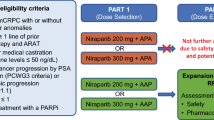Summary
The antitumor activity and toxicity of trimetrexate (TMTX) was evaluated in measurable, hormone-refractory, advanced prostate cancer patients. Patients were required to have an ECOG performance status < 3, bidimensionally measurable disease, serum creatinine ≤ 1.5 mg/dL, normal bone marrow function, and adequate hepatic function. Prior non-hormonal systemic therapy, active infection, third space effusions were exclusion criteria. TMTX 12 mg/m2 daily for five days (8 mg/m2 for patients with any prior radiation therapy or age ≥75 years) was administered every 3 weeks. There were no responses in the 18 eligible patients. Median time to treatment failure and median survival were 6 and 20 weeks, respectively. Myelosuppression was the most frequent toxicity observed and was mild to severe in all but 4 patients. Two patients whom experienced life-threatening reversible leukopenia and grade 4 thrombocytopenia developed in 2 further patients. Non-hematologic toxicity was also reversible and was mild to severe. TMTX at this dose and schedule is inactive in advanced, hormone-refractory prostate cancer.
Similar content being viewed by others
References
Huggins C, Hodges CV: Studies in prostatic cancer: I. The effect of castration of estrogen and of androgen injection on serum phosphatases in metastatic carcinoma of the prostate. Cancer Res 1:293–297, 1941
Huggins C, Stevens RE, Hodges CV: Studies in prostatic cancer: II. The effects of castration on advanced carcinoma of the prostate gland. Arch Surg 43:209–233, 1941
Sogani PC, Vagaiwala MR, Whitmore WF: Experience with flutamide in patients with advanced prostatic carcinoma without prior endocrine therapy. Cancer 54:744–750, 1984
Leuprolide Study Group: Leuprolide versus diethylstilbestrol for metastatic prostatic cancer. N Engl J Med 331:1281–1286, 1984
Crawford ED, Eisenberger MA, McLeod DG, Spaulding JT, Benson R, Dorr FA, Blumenstein BA, Davis MA, Goodman PJ: A controlled trial of leuprolide with and without flutamide in prostatic carcinoma. N Engl J Med 321:419–424, 1989
Eisenberger MA, Simon R, O'Dwyer PJ, Wittes RE, Friedman MA: A reevaluation of non-hormonal cytotoxic chemotherapy in the treatment of prostatic carcinoma. J Clin Oncol 3:827–841, 1985
Tannock IF: Is there evidence that chemotherapy is of benefit to patients with carcinoma of the prostate? J Clin Oncol 3:1013–1021, 1985
Loening SA, Beckley S, Brady MF, Chu TM, deKernion JB, Dhabuwala C, Gaeta JF, Gibbons RP, McKiel CF, McLeod DG, Pontes JE, Prout GR, Scardino PT, Schlegel JU, Schmidt JD, Scott WW, Slack HN, Soloway MS, Murphy GP: Comparison of estramustine phosphate, methotrexate, and cis-platinum in patients with advanced, hormone-refractory prostate cancer. J Urol 129:1001–1006, 1983
Curt GA, Jolivet J, Carney DN, Bailey BD, Drake JC, Clendeninn NJ, Chabner BA: Determinants of the sensitivity of human small-cell cancer cell lines to methotrexate. J Clin Invest 76:1323–1329, 1985
Elslager EF, Davoll J: Synthesis of fused pyrimidines as folate antagonists. In: Castle RN, Townsend LR (eds) Lectures in Heterocyclic Chemistry, vol 2. Orem, Utah, Hetero, 1974, pp S97–S133
Kamen BA, Eibl B, Cashmore AR, Bertino JR: Uptake and efficacy of trimetrexate (TMQ, 2,4-diammino-5-methyl-6-[(3,4,5-trimethoxyanilino)methyl]quinazoline), a nonclassical antifol, in methotrexate-resistant leukemia cellsin vitro. Biochem Pharmacol 33:1697–1699, 1984
Broome MG, Johnson RK, Wodinski I: Biochemical and biological characterization of two new antifols, NSC 127755 and TMQ, in comparison with methotrexate. Proc Am Assoc Cancer Res 21:209, 1980 (abstract)
Eisenhauer EA, Zee BC, Pater JL, Walsh WR: Trimetrexate: Predictors of severe of life-threatening toxic effects. J Natl Can Instit 80:1318–1322, 1988
Oken MM, Creech RH, Tormey DC, Horton J, Davis TE, McFadden ET, Carbone PP: Toxicity and response criteria of the Eastern Cooperative Oncology Group. Am J Clin Oncol5:649–655, 1982
Kaplan EL, Meier P: Nonparametric estimation from incomplete observations. J Am Stat Assoc 53:457–481, 1958
Scher HI, Curley T, Geller N, Engstrom C, Dershaw DD, Lin S-Y, Fitzpatrick K, Nisselbaum J, Schwartz M, Bezirdjian L, Eisenberger M: Trimetrexate in prostate cancer: Preliminary observations on the use of prostatic-specific antigen and acid phosphatase as a marker in measurable hormone-refractory disease. J Clin Oncol 8:1830–1838, 1990
Author information
Authors and Affiliations
Rights and permissions
About this article
Cite this article
Witte, R.S., Yeap, B.Y. & Trump, D.L. Trimetrexate in advanced hormone-refractory prostate cancer. Invest New Drugs 12, 255–258 (1994). https://doi.org/10.1007/BF00873968
Issue Date:
DOI: https://doi.org/10.1007/BF00873968




